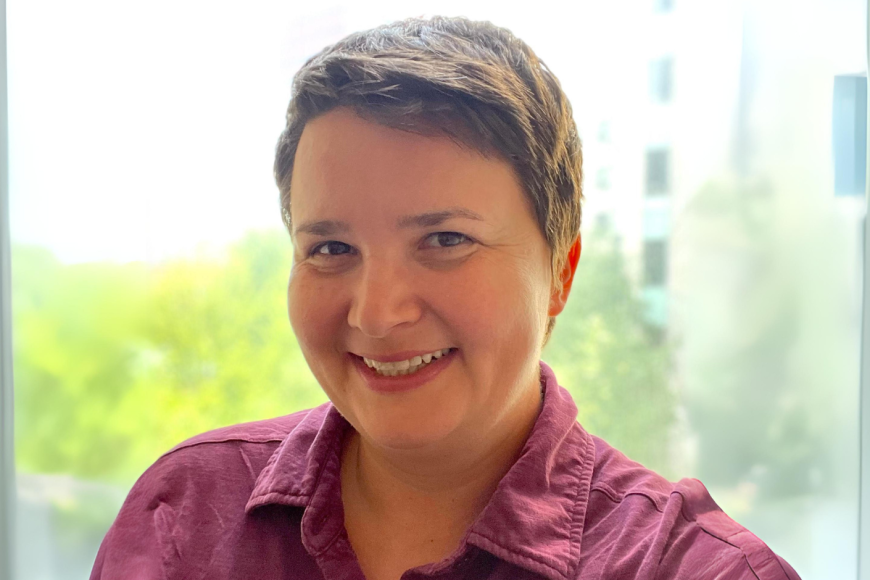Biography
Laura Frye-Levine is an environmental sociologist who studies sustainability knowledge work. She engages in both traditional academic research and in the practice of interdisciplinary collaboration. This work is informed by her formal training in both social science and natural science, as well as her time spent as a practitioner of sustainable development with local people who are the experts of their own needs and interests.
Laura earned dual PhDs in Sociology and Environmental Studies at the University of Wisconsin-Madison, and spent a year as a visiting research fellow at the Harvard Kennedy School of Government. Her dissertation examined collaborative efforts between economists and ecologists to craft more comprehensive approaches to environmental conservation. As an inaugural Impact Fellow with MIT’s Climate and Sustainability Consortium (2021-2024), she studied the logics of sustainability used by institutional practitioners and the challenges faced by interdisciplinary teams seeking to collaboratively develop climate solutions.
Laura has a professional background in sustainable development and community-engaged design. She received a Master’s of Environmental Science from the Yale School of the Environment, where she studied community-based conservation efforts in a remote village near Cusuco National Park in Honduras. She returned to this community to document the complexities of conservation and development efforts in the film Export (2009), which brought the voices of smallholder coffee producers to an international audience. Prior to becoming a sociologist, she served as Director of Research of the Center for Sustainable Cities at the University of Kentucky in her hometown of Lexington. She has collaborated and advised on projects funded by the European Commission, the UN Population Program, the US National Science Foundation, the Mellon Foundation, the Wisconsin Center for Integrated Agricultural Systems, the Yale Tropical Resources Institute, the Yale Program in Agrarian Studies, and the Yale Hixon Center for Urban Sustainability.
Laura has mentored students working on sustainability-related topics from within a wide range of fields, including: engineering, computer science, urban studies, sociology, public health, public policy, sustainable development, and curriculum design. She is currently mentoring undergraduate and PhD research at MIT, the University of Washington, and Central Asian University.
Research
My current research focuses on sustainability knowledge work in large organizations. Using qualitative and ethnographic methods, I examine the social and epistemic forces that constrain and enable the rational management of sustainability as a collection of desired material outcomes and articulation of possible human futures. Three current project areas are summarized below.
The first project is an in-depth interview study of the practices and logics of professionals working to implement social sustainability principles within large corporations. I am interested in how individuals manage the expanding demands and dimensions of social sustainability, as well as the logics of action they use to guide approaches to institutional change. This work is in collaboration with a colleague in MIT’s Department of Urban Studies and Planning.
The second project is a taxonomy of social sustainability concepts communicated in corporate sustainability reports. Through extensive human-coding and systematic intercoder validation, we have developed an expanded library of social sustainability concepts used in organizational speech. Our research catalogs the complexity of engagement with social sustainability concepts beyond any existing standardized instrument of evaluation or accountability. This breadth of social sustainability categories has not been previously characterized in the literature on sustainability reporting, and provides a detailed view into the rapidly expanding landscape of social sustainability discourse. This work is in collaboration with several undergraduate researchers at MIT and a PhD student at the University of Washington.
The third project is a study of the epistemic and infrastructural challenges faced by multidisciplinary research teams seeking to cross epistemic divides to develop climate solutions that are both biophysically durable and socially desirable. This work is in collaboration with interlocutors across the physical sciences and engineering at MIT and at other major global research institutions.
Practice
My “infrastructure” work brings social science and social scientists in conversation with engineers, physical scientists, and practitioners engaged in research directed towards climate and sustainability solutions.
All too often, practices of collaboration bring in social scientists too late in the research process - as a hedge against failure at the point of implementation. This is a frequent lament among social scientists, as well as a structural barrier to impact that has been well-documented in a number of fields: sustainable development, community-engaged and human-centered design, interdisciplinarity & transdisciplinarity (ITD), and science and technology studies (STS). When people are implicated as users or beneficiaries of technology, affected by its negative impacts, or are being asked to accept or participate in large-scale technical change, the most successful solutions involve collaboration with social scientists at the outset of project design - in the ‘problem definition’ phase.
As a ‘socio-technical translator’ at MIT, I bring social science and social scientists in conversation with engineers and physical scientists engaged in research directed towards climate and sustainability solutions. I enjoy the challenge of integrating social determinants of sustainability with the more well-characterized physical parameters of climate problems and potential solutions. I work to build meaningful relationships that bring a ‘whole brain’ approach to the extraordinary sustainability challenges facing humanity. At MIT, I am currently collaborating with experts at the Environmental Solutions Initiative, the School of Engineering, the School of Science, Sloan Sustainability Initiative, the Climate and Sustainability Consortium, and MIT’s new institute-wide Climate Project. My work is informed by my training in social science and natural science, as well as my time as a practitioner of sustainable development with local people who are the experts of their own needs and interests.
I host an annual ‘Expert-Practitioner Knowledge Convergence’ round table workshop at MIT for peer-to-peer dialogue between sustainability professionals and social scientists on social science research topics of relevance to the complex landscape of sustainability practice.
Starting in the spring of 2025, I am organizing a series of workshops with the aim of developing an MIT-specific toolkit for interdisciplinary climate and sustainability collaboration. Please reach out if you are interested in learning more.
